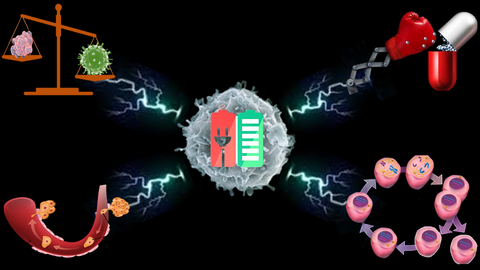Cancer metabolism
Cancer cells require dramatically high levels of energy and biomass to fuel their rapid growth. How tumors alter their metabolism to meet these high demands has always fascinated scientists. Cytosolic glycolysis and mitochondrial oxidative phosphorylation “OXPHOS” are the main energy-producing pathways. For decades, metabolic reprogramming of tumors was perceived as only increased glycolysis as postulated by Otto Warburg1 almost a century ago. This simplistic view has recently been challenged and revised as we started to realize that tumor metabolism is more heterogeneous than initially assumed 2. The concept of metabolic plasticity has recently emerged as we started to realize that some tumors are able to switch between alternative metabolic programs to meet challenges exerted by drugs targeted against a certain metabolic pathway or during the course of tumorigenesis.
Our results show that metabolic plasticity allows tumour cells to switch metabolism regiment when a specific pathway is blocked in mice 3. Experiments performed in animals also show that the possibility to rapidly adapt energy pathways is linked with the emergence of resistance to cancer therapy drugs.
- Dissect the molecular mechanisms of metabolic plasticity
- Unravel the contribution of metabolic adaptations to metastasis and drug resistance
- Exploring therapeutic implications of bioenergetic plasticity
Lab members:
| POSITIONS | |
|---|---|
| 09/2019 | MSNZ Fellow and Research group leader at IKL/MK1 TU Dresden |
| from 2019 | Research fellow at Institue of Molecular Genetics, Prague |
| 12/2015-12/2018 | Research Project leader, INDICAR program, University of Vienna |
| 07/2011-11/2015 | Postdoctorial Research fellow, Dept. Experimental Oncology, European Institute of Oncology, Milan |
| 03/2007-10/2007 | Participating Scientist in KIDSTEM (Milan) and RATstreamTM (Tübingen) |
| EDUCATION | |
|---|---|
| 11/2007- 07/2011 | PhD in Medical Genetics, Trinity College, Dublin |
| 10/2005-01/2007 | MSc of Molecular Medical Biotechnology, Ghent University, Belgium |
| 09/1994-05/2000 | BSc studies of Medicine and Clinical Pharmacology, Ain Shams University, Cairo |
|
CLINICAL EXPERIENCE |
|
|---|---|
| 08/2004-08/2005 |
Alnadhy Medical Company KSA |
| 01/2002-08/2004 | Elgouna International Hospital, El Gouna, Egypt |
| 06/2000-07/2002 | Emergency and Intensive Care Unit, Elmataria Teaching Hospital, Cairo |
| HONORS | |
|---|---|
| 2019 | ERC Starting grant together with TU Dresden |
| 2015 | INDICAR fellowship, University of Vienna |
| 2014 | Umberto Veronesi Postdoctorial fellowship |
| 2012 | Berlucchi Foundation for Cancer Research Young Researcher Award |
| 2012 | AIRC/Marie Curie International fellowship in Cancer Research |
| 2012 | EU Frame work programme 7 (FP7) Marie Curie Actions -co-funded Structured International Post-Doctoral Program -SIPOD |
| 2007 | Marie Curie Actions Early Researcher fellowship (ApopTrain and KIDSTEM) |
Dr Elgendy serves as a member of editorial board and/or a selected reviewer of a number of journals including: Plos One, Autophagy, Scientific Reports, Molecular & Cellular Oncology, Experimental and Clinical Cancer Research, JoVE, Translational Cancer Research, Biomedicine and Biotechnology, Cellular Physiology, Antioxidants.
Complete publication record see ORCID
LINKS
ORCID
 © Thomas Albrecht
© Thomas Albrecht
PhD-student
NameFilippo Ferrucci
 © Thomas Albrecht
© Thomas Albrecht
Katerina Podzimkova
Technician
 © Thomas Albrecht
© Thomas Albrecht
Wentao Gui
 © Thomas Albrecht
© Thomas Albrecht
Postdoc
NameJuan Alberto Pérez-Valencia
Selected publications:
Elgendy M.*, Cirò M., Mazzarella L., Ferrari E., DeCensi A., Bonanni B., Janssens V., Pelicci P.G., Foiani M. and Minucci S*. Combination of Hypoglycemia and Metformin Impairs Tumor Metabolic Plasticity and Growth by Modulating the PP2A-GSK3β-MCL-1 Axis. 2019 Cancer Cell. *Co-corresponding authors
-Reviewed in: Teaching an Old Drug New Tricks. Cancer Cell. 2019 May 13;35(5):709-711. doi: 10.1016/j.ccell.2019.04.008.
Elgendy M. , Pablo Fusco J.P. , Segura V., Lozano M.D., Minucci S., Echeveste J.I., Gurpide A., Andueza M., Melero I., Sanmamed M. F., Ruiz M.R., Calvo A., Pascual J.I, Velis J. M., Miñana B., Pio R., Agorreta J., Patiño A., Jose Luis Perez-Gracia J. L. Identification of mutations associated with acquired resistance to sunitinib in renal cell-cancer. 2019 International Journal of Cancer. 2019 Mar 8. doi: 10.1002/ijc.32256.
Elgendy M.*,Abdel-Aziz A.K., Renne S.L., Bornaghi V., Procopio G., Colecchia M., Kanesvaran R., Toh C.K., Bossi D., Pallavicini I., Perez-Gracia J.L., Lozano M.D., Giandomenico V., Mercurio C., Lanfrancone L., Fazio N., Nole F., Teh B.T., Renne G., Minucci S*. Dual modulation of MCL-1 and mTOR determines the response to sunitinib. 2017 Journal of Clinical Investigation 127(1):153-168 *Co-corresponding authors
-Reviewed in: -Targeted therapy: Sunitinib modulates MCL-1 and mTOR signalling. Sidaway P. Nat Rev Clin Oncol. 2017 Feb;14(2):70. doi: 10.1038/nrclinonc.2016.208. -The yin yang of sunitinib: one drug, two doses and multiple outcomes. 2017 Molecular and Cellular Oncology 23;4 (2):e1285385 doi: 10.1080/23723556.2017.1285385
Elgendy M., Ciro M., Saad Eldin A., Belmonte G., Dal Zuffo R., Mirraco C., Mercurio C., Lanfrancone L., Foiani M and Minucci S. Beclin 1 restrains tumorigenesis through Mcl-1 destabilization in an autophagy-independent reciprocal manner.2014 Nature Communications 5:5637. doi: 10.1038/ncomms6637
-Reviewed in: Autophagy-independent role of Beclin 1 in promoting Mcl-1 degradation contributes to its tumor suppressor effect. 2015 Autophagy 11:3, 581-582
Elgendy M., Sheridan C., Brumati G. and Martin S.J. Oncogenic Ras-Induced Expression of Noxa and Beclin-1 Promotes Autophagic Cell Death and Limits Clonogenic Survival. 2011 Molecular Cell 42(1), 23 – 35
Reviewed in: - One Way or Another, Ras Is Gonna Getcha. 2011 Cell 144,631-633 -Autophagy: Limiting factors. 2011 Nature Reviews Cancer 11, 313 -Autophagy in Ras-Induced Malignant Transformation: Fatal or Vital? 2011 Molecular Cell 42(1), 1-3 d
Open Positions
Our group offers in cooperation with the Carus Promotionskolleg funded thesis topics for MD-students with a strong interest in translational cancer research. In case you are interested, please get in touch!
A unique opportunity is open for a motivated postdoc with interest in cancer research to apply for an indvidual postdoc fellowships to join our group at the biomedical Dresden campus.
We are seeking for a highly motivated technical assistence with backgroundin animal work (mice) and molecular techniques.
Contact
 © Thomas Albrecht
© Thomas Albrecht
Elgendy lab
Visiting address:
Technische Universität Dresden (TUD), Medizinisch Theoretisches Zentrum (MTZ), Haus 91, Raum A20 044 Fiedlerstraße 42
01307 Dresden
Postal address:
TUD Dresden University of Technology Technische Universität Dresden (TUD), Medizinisch Theoretisches Zentrum (MTZ) Dr. Mohamed Elgendy Fetscherstrasse 74
01307 Dresden



